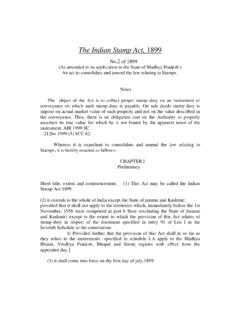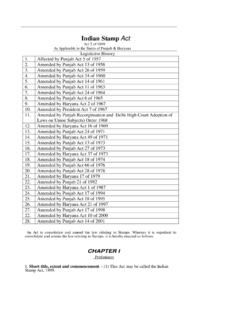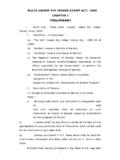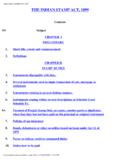Transcription of Principles of Business and Administration Start Date: End …
1 HABCThe Intermediate Level Apprenticeship inAPPRENTI KITName:Learner N :Assessor/IQA: Start Date: End Date: Principles of Business and Administration (Diploma) HABC 2016 TextbookJ/506/1899 Principles of providingadministrative services HABC 20162J/506/1899 V1: October 2016 Understand the organisation and Administration of meetingsDescribe the features of different types of meetingsThere is a wide range of different meetings that take place within a Business environment. They will tend to be either formal meetings or informal meetings; therefore the nature of these meetings can vary meetings will include meetings such as: annual general meetings board meetings management/departmental meetings committee meetings annual performance review meetingsWe will now explore each of these in more detail. Annual general meetings (AGM) An annual general meeting is a meeting that many companies, especially those with shareholders, are required by law (or the constitution or charter governing the company) to hold.
2 There must be a period of notice given for these meetings to ensure interested and eligible parties can attend or vote at them. An AGM is held every year to elect or re-elect the board of directors and inform the shareholders or members of previous and future activities. It is an opportunity for the shareholders or members to receive copies of the company s annual accounts, as well as reviewing financial information for the past year and asking any questions regarding the direction the Business will take in the meetings A board meeting is a formal meeting of the board of directors of an organisation, usually held at set intervals of time to consider policy matters and any significant problems. The meeting will be presided over by the chairperson of the organisation or their appointee. There must be a minimum number of directors present for the meeting to be valid, there will be an agenda and minutes of the meeting must be meetings Management and departmental meetings tend to take place on a frequent basis, often weekly.
3 They are used for a number of reasons including reviewing the organisation s management systems at planned intervals to ensure their continuing suitability, adequacy and effectiveness. In addition, the financial performance of the area under review will be considered and any action points agreed. These meetings are used to keep everyone in the team up to date on what HABC 20163J/506/1899 V1: October 2016is happening in their area and to maintain adequate control of key areas such as profit and loss, staffing matters, and sales and marketing meetings Some organisations (often membership-based organisations) will hold regular committee meetings, as in some organisations the committee is responsible for managing the key processes within it. A committee meeting will often be very similar in structure to a board meeting with a chairperson; often the treasurer and secretary will be present and the minutes of the meeting will be taken. Committee meetings will tend to be held on a regular basis such as every week or every few performance review meetingMost organisations have a formal process in place for managing the performance of their employees.
4 In an annual performance review, a manager/supervisor will be joined by an employee to discuss their performance for the period under review, and set objectives and agree on an action plan for the next year. A written document will be used to record the key points of the discussion and the action meetings These can take place in a wide range of locations. It may be in an office, in the staff restaurant or any other place where staff can get together to discuss a range of matters related to the Business . Informal meetings tend to occur more frequently than formal meetings and often no written record will be kept. Perhaps a brief note or email after the meeting will act as the follow up types of meetings take place in your workplace?A range of formal and informal meetings help to ensure the smooth running of many Point HABC 20164J/506/1899 V1: October 2016 Outline the different ways of providing administrative support for meetingsWhen organising meetings, there is often a need for a significant amount of administrative support to ensure they run smoothly, and those attending have the relevant information and resources available to ensure the meeting is as effective as possible.
5 The type of support needed will often be dependent on the type of meeting that is to be arranged. The following points are typical of what might need to be considered. What is the purpose of the meeting? Are there terms of reference set for themeeting? How many people are attending? Howmany have sent their apologies? Where will the meeting take place andwhat are the timings? Who is chairing the meeting? Are there any papers that needcirculating before the meeting and howlong before? Is there an agenda? Are there previous minutes and actions? What are the travel and accommodationrequirements? What are the catering requirements? Are there any special requirements suchas presentation equipment?It is clear that there is a wide range of different ways that administrative support can be offered to ensure the smooth running of meetings, thus ensuring the maximum benefit is achieved from examples of the types of administrative support available in your applied administrative support can have a big impact on the effectiveness of the steps involved in organising meetingsTo organise meetings effectively, there are a number of things you must know.
6 Necessary steps include deciding on: the aim of the meeting who must attend the date a convenient location what documents are needed - agenda,previous minutes, action points type and size of the room required any equipment required catering arrangements to be made accommodation requirements needed travel arrangements required how to communicate all relevantinformation to attendeesKey Point HABC 20165J/506/1899 V1: October 2016 the correct set up of the room the stationery, name badges, pens andpencils that should be availableEnsuring adequate notice is given prior to all meetings is important so that the attendees are available, fully prepared and, where necessary, clear about their roles and responsibilities. When organising meetings, communication to everyone involved is very important. That includes delegates, support services and meetings to be successful, they must be managed before, during and after they take of the chapter s key range of formal and informalmeetings help to ensure the smoothrunning of many applied administrativesupport can have a big impact on theeffectiveness of meetings to be successful, theymust be managed before, during andafter they take placeUnderstand the organisation of travel and accommodationDescribe the features of different types of Business travel and accommodationThe organisation of Business travel and accommodation is often necessary to ensure that meetings take place with the required people being able to attend and that they arrive ready to contribute fully to the successful outcome of the meeting.
7 You may be required to book travel for a colleague to attend a meeting in another part of the country. From some places it may be easier to travel by train than it would be to drive and, possibly, avoid getting stuck in , deciding on the most appropriate type of travel and, where required, accommodation, is an important part of providing effective administrative types of Business travel and accommodation have a variety of different features, and it is these features that will determine which ones are the most appropriate to be booked, along with organisational policies regardingthe types of travel andaccommodation permitted and the costsassociated with Point HABC 20166J/506/1899 V1: October 2016 Different types of travel and accommodation provide a range of options to the purpose of confirming instructions and requirements for Business travel and accommodation When organising travel and accommodation arrangements, there are a number of things that have the potential to go wrong or be overlooked.
8 Therefore, it is very important to ensure that a number of points are checked and confirmed prior to booking travel arrangements and/or points that must be fully checked and confirmed include: names and contact details of the peopletravelling starting point and times destination and times method of travel, plane, train, car class of travel arrangements for collection/distributionof tickets/booking confirmation documents required passports type and standard of accommodation any special requirementsFailure to check all the details when making travel arrangements or not communicating them to the people concerned, could lead to problems with flights/trains being missed, the wrong type of accommodation being booked and travellers not having the travel documents they require. All of these issues could have a significant impact on the success of the meeting the arrangements are being made procedures do you have to carry out to ensure travel and accommodation requirements have been confirmed?
9 It is very important to ensure all travel and accommodation arrangements are fully checked prior to bookingand then communicated PointKey Point HABC 20167J/506/1899 V1: October 2016 Explain the purpose of keeping records of Business travel and accommodationAll organisations have a requirement for accurate record-keeping, both from an internal policy point of view and a legal perspective. Therefore, it is important to ensure that accurate records are and accommodation costs will be subject to an internal audit, and the individuals concerned may also have to submit expenses claims. If there are any queries about the arrangements made, or if there are any problems or disputes later, then accurate record-keeping and receipts will assist in these situations. In addition, from a company law point perspective and to ensure all tax implications are met, the keeping of accurate records is very important. What are the record-keeping processes you have in your organisation?
10 Keeping records is important from legal and accounting perspectives and also because of of the chapter s key points:1. Different travel and accommodation types provide a whole range of different options to businesses and their employees2. It is very important to ensure all travel and accommodation arrangements are fully checked prior to booking and then communicated effectively3. Keeping records is important from an audit, legal and accounting perspective Understand how to manage diary systemsDescribe the features of hard copy and electronic diary systemsThe world of Business is often a very complex place with many demands on the time of people involved in the organisation. Effective management of time, meetings, individual diaries and group diaries are all important in terms of assisting in the effective management of the an organisation does not have effective processes in place in terms of diary management, there are a number of possible consequences: poor time management and therefore loss of efficiency, loss of potential Business opportunities, stressful situations for individuals due to deadlines not being communicated properly and mistakes being made in terms of double management systems tend to be either manual or electronic.








